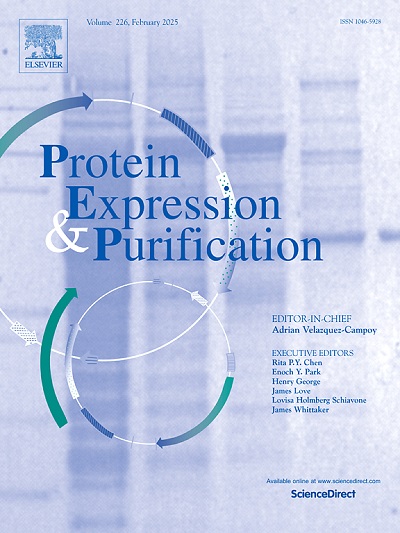A recombinant human SLPI variant suppresses the formation of neutrophil extracellular traps at low concentrations in vitro
IF 1.2
4区 生物学
Q4 BIOCHEMICAL RESEARCH METHODS
引用次数: 0
Abstract
Neutrophil extracellular traps (NETs) are web-like structures released by neutrophils to trap and kill microbes. While NETs are crucial in host defense, excessive formation can lead to autoimmune diseases. Currently, no specific drugs target NETs directly; however, some medications can indirectly modulate their formation. The secretory leukocyte protease inhibitor (SLPI) is a small protein that inhibits the activity of neutrophil elastase (NE), an enzyme essential for NETs formation. By inhibiting NE activity, SLPI prevents the chromatin from decondensing, which is necessary for NETs to form; this suggests that SLPI may protect by preventing excessive NETs development. However, evidence indicates that NE can inactivate SLPI by cleaving its N-terminus. This action can create a protease/antiprotease imbalance, potentially leading to detrimental consequences for the host. In this study, we produced a recombinant variant of SLPI (SLPI-S15G-A16G: rSLPIv) using recombinant DNA technology, expressed in Escherichia coli SHuffle T7. The protein was tagged with the small metal-binding protein (SmbP) to facilitate its expression and purification through immobilized metal-affinity chromatography. Our results demonstrated that rSLPIv exhibited immunomodulatory activity at a concentration of 10 nM in neutrophils that had been prestimulated with PMA. It reduced NETs formation by 30 % and maintained this effect for up to 6 h. Confocal microscopy confirmed these findings, revealing a rSLPIv-dependent reduction in neutrophil nuclear expansion. Thus, rSLPIv shows significant suppressive activity on NETs formation at low concentrations, making it a potential candidate as an immunotherapeutic agent.
重组人SLPI变体在体外低浓度抑制中性粒细胞胞外陷阱的形成
中性粒细胞胞外陷阱(NETs)是由中性粒细胞释放的网状结构,用于捕获和杀死微生物。虽然net在宿主防御中至关重要,但过度形成可导致自身免疫性疾病。目前,没有直接针对NETs的特异性药物;然而,一些药物可以间接调节它们的形成。分泌性白细胞蛋白酶抑制剂(SLPI)是一种抑制中性粒细胞弹性酶(NE)活性的小蛋白,NE是NETs形成所必需的酶。通过抑制NE活性,SLPI阻止了染色质的去浓缩,而去浓缩是形成net所必需的;这表明SLPI可以通过防止过度的net开发来保护。然而,有证据表明NE可以通过切割SLPI的n端使其失活。这种作用会造成蛋白酶/抗蛋白酶失衡,可能导致对宿主有害的后果。在这项研究中,我们利用重组DNA技术产生了SLPI的重组变体(SLPI- s15g - a16g: rSLPIv),在大肠杆菌SHuffle T7中表达。用小金属结合蛋白(small metal-binding protein, SmbP)标记该蛋白,通过固定化金属亲和层析进行表达和纯化。我们的研究结果表明,rSLPIv在PMA预刺激的中性粒细胞中表现出10 nM浓度的免疫调节活性。它减少了30%的NETs形成,并维持了长达6小时的效果。共聚焦显微镜证实了这些发现,揭示了rslpiv依赖性中性粒细胞核扩张的减少。因此,rSLPIv在低浓度下对NETs的形成表现出显著的抑制活性,使其成为一种潜在的候选免疫治疗剂。
本文章由计算机程序翻译,如有差异,请以英文原文为准。
求助全文
约1分钟内获得全文
求助全文
来源期刊

Protein expression and purification
生物-生化研究方法
CiteScore
3.70
自引率
6.20%
发文量
120
审稿时长
32 days
期刊介绍:
Protein Expression and Purification is an international journal providing a forum for the dissemination of new information on protein expression, extraction, purification, characterization, and/or applications using conventional biochemical and/or modern molecular biological approaches and methods, which are of broad interest to the field. The journal does not typically publish repetitive examples of protein expression and purification involving standard, well-established, methods. However, exceptions might include studies on important and/or difficult to express and/or purify proteins and/or studies that include extensive protein characterization, which provide new, previously unpublished information.
 求助内容:
求助内容: 应助结果提醒方式:
应助结果提醒方式:


